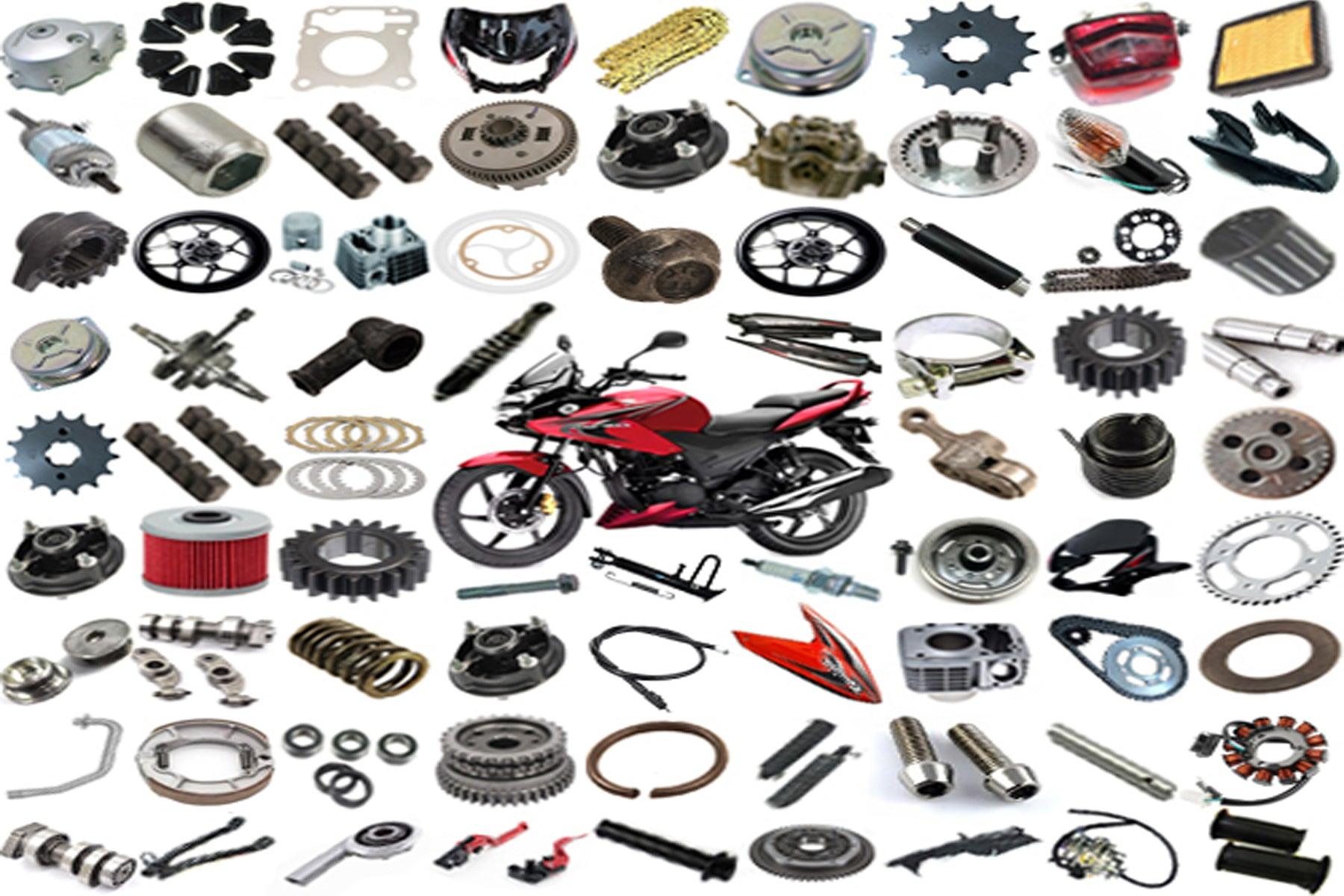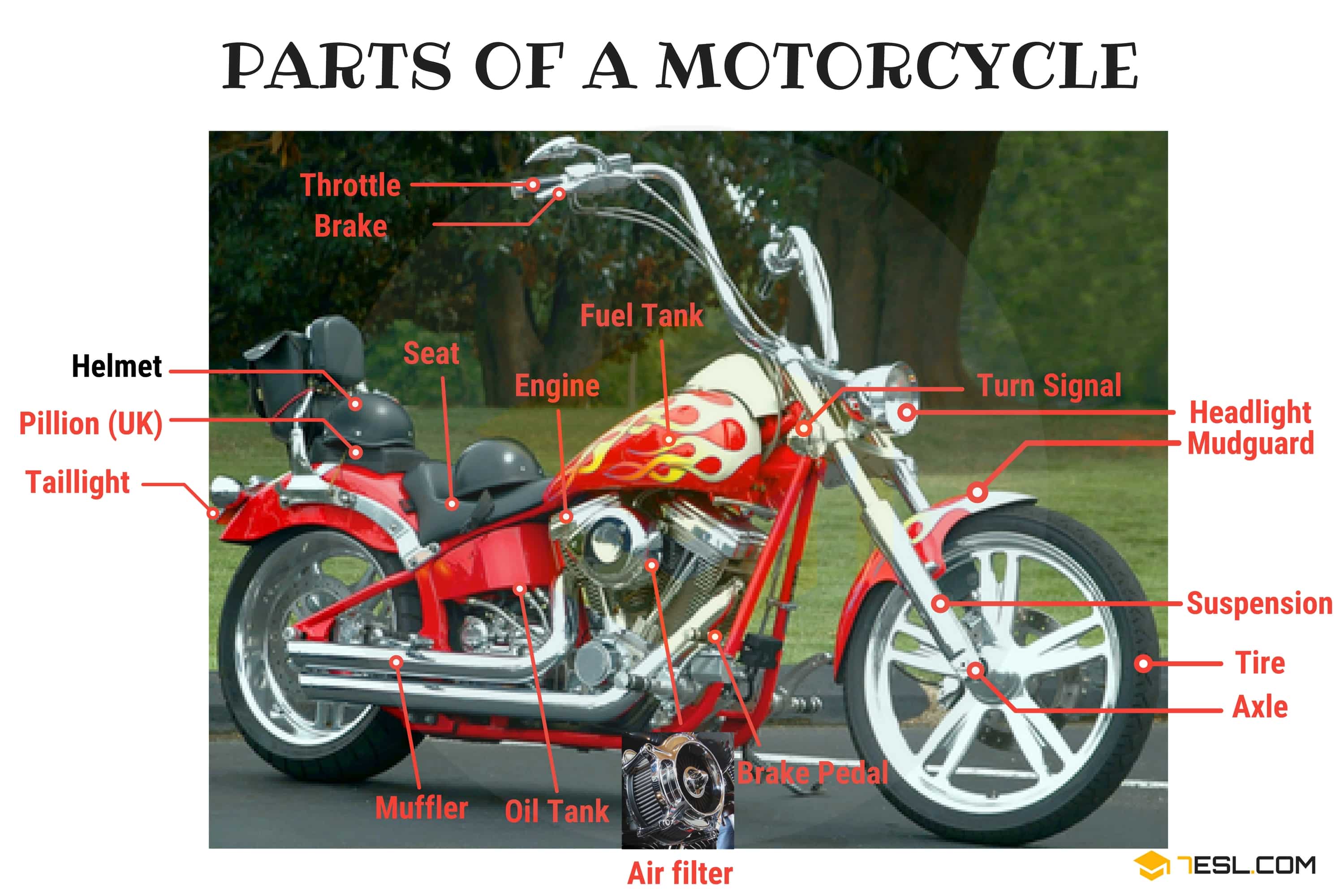What Makes High-Grade Motorcycle Parts Auckland Essential for Daily Commuters
What Makes High-Grade Motorcycle Parts Auckland Essential for Daily Commuters
Blog Article
Discover the Vital MotorBike Components You Required for Ideal Performance
Recognizing the vital parts of a motorbike is essential for accomplishing peak efficiency. Each element, from the engine to the stopping system, plays a crucial duty in total performance and safety and security. Routine upkeep can stop unanticipated failings and improve the riding experience. Many motorcyclists overlook the ins and outs of these systems. Uncovering just how they collaborate can cause a more reliable trip. What critical components should every cyclist prioritize?
The Engine: The Heart of Your Bike
The engine works as the core part of a bike, driving its performance and defining its abilities. It is liable for converting gas right into mechanical power, which powers the bike forward. Various sorts of engines are utilized, including single-cylinder, V-twin, and inline arrangements, each offering distinctive characteristics suited for various riding designs and purposes. The engine dimension, normally gauged in cubic centimeters (cc), considerably influences efficiency, with bigger engines generally giving even more power and torque.Furthermore, the engine's layout and modern technology, such as gas shot systems or air-cooling versus liquid-cooling, impact performance and integrity. Maintenance is vital for peak operation; aspects like normal oil modifications and monitoring ignition system guarantee durability. Bikers commonly take into consideration an engine's responsiveness and level of smoothness, as these characteristics enhance the overall riding experience. Eventually, the engine stays a vital component that specifies not only the motorbike's efficiency but also the biker's link to the equipment.
The Transmission: Shifting Gears Smoothly
The transmission plays a necessary role in a motorcycle's efficiency, specifically in the mechanics of equipment changing. Recognizing exactly how to shift equipments efficiently can boost the total riding experience, while routine upkeep guarantees peak functionality. Appropriate focus to these elements can substantially influence the long life and performance of the bike.

Equipment Shifting Mechanics
Smooth gear changing is vital for suitable motorcycle efficiency, greatly influencing both velocity and control. The technicians of equipment moving entail the communication between the clutch, gear bar, and transmission system. When a biker engages the clutch, it disengages the engine from the transmission, permitting an equipment modification without harming the parts. A well-timed release of the clutch, incorporated with accurate activity of the equipment lever, helps with a seamless change in between equipments. This procedure guarantees that the engine runs within its ideal power band, enhancing performance. Motorcycle Parts Auckland. In addition, comprehending the gear ratios and their effect on speed and torque can help bikers make informed options throughout changes, inevitably adding to an extra satisfying and receptive riding experience
Upkeep Tips Value
Routine upkeep plays an important duty in assuring that the transmission system runs efficiently, enabling for smooth gear shifts. Consistently changing the transmission and checking liquid is vital, as old liquid can bring about enhanced rubbing and wear. Additionally, evaluating the clutch for wear warranties peak involvement and disengagement, avoiding slippage throughout equipment modifications. Lubrication of relocating components is equally essential to decrease friction and boost efficiency. Motorcycle owners should additionally check for leaks and uncommon noises, as these can suggest underlying concerns. By adhering to these maintenance suggestions, cyclists can prolong the life-span of their transmission system, guaranteeing that gear changes stay smooth and adding to the overall performance of their motorbike.
The Braking System: Ensuring Safety on Every Ride
Braking systems are fundamental elements that straight influence a motorbike's security and performance. They contain different components, including brake pads, rotors, calipers, and hydraulic lines, all interacting to assure effective deceleration. The kind of braking system-- generally either disc or drum-- affects responsiveness and stopping power.Regular maintenance is vital to maintain peak efficiency; worn brake pads can bring about decreased effectiveness and enhanced quiting ranges. Furthermore, the quality of brake fluid need to be checked, as it can absorb dampness in time, compromising stopping efficiency.Riders should additionally consider the relevance of anti-lock stopping systems (ABDOMINAL MUSCLE), which prevent wheel lockup during abrupt quits, improving overall safety. Correctly functioning brakes are not practically quiting; they instill self-confidence in the biker, enabling safer navigating via different terrains. Eventually, a reliable stopping system is crucial for taking pleasure in every ride with peace of mind.
The Suspension: Enhancing Convenience and Control
A well-functioning shock absorber substantially contributes to a motorbike's total efficiency, complementing the effectiveness of the braking system. The suspension plays a significant role in taking in shocks from unequal surfaces, ensuring a smoother experience while keeping tire call with the roadway. This contact is crucial for both security and control, permitting motorcyclists to navigate corners with confidence and precision.Different kinds of shock absorber, such as telescopic forks or mono-shocks, provide differing degrees of convenience and handling. Appropriately tuned suspension enhances responsiveness, providing the motorcyclist with a much more linked feeling to the motorcycle. Normal maintenance checks are very important to ascertain the suspension components, including dampers and springtimes, are functioning at their best. An effective suspension system not just elevates the riding experience yet also adds to the durability of various other motorcycle parts by reducing deterioration. Therefore, investing in high quality suspension is vital for any serious motorcycle fanatic.
The Tires: Linking You to the Road
Tires play a vital role in a motorcycle's performance, acting as the key link between the road and the biker. Understanding the various sorts of tires readily available can greatly affect handling and safety and security. In addition, normal maintenance is important to ensure peak tire efficiency and longevity.
Tire Keys In Explained
How do various tire types affect a motorcycle's efficiency? Tire kinds play a vital duty in figuring out a motorcycle's handling, grasp, and stability. Sport tires, designed for high efficiency, deal boosted traction and responsiveness on paved roads, making them suitable for competing and aggressive riding. Conversely, touring tires prioritize sturdiness and comfort, offering a smoother adventure for long-distance traveling. Off-road tires, identified by their tough walk patterns, stand out in grip on unpaved surface areas, suitable for experience enthusiasts. In addition, dual-sport tires blend qualities from both off-road and on-road classifications, providing home to functional riding demands. Inevitably, selecting the ideal tire kind is necessary for optimizing efficiency, guaranteeing safety, and boosting the overall riding experience.
Maintenance Tips Offered
While riding when driving, preserving ideal tire condition is crucial for security and performance. On a regular basis inspecting tire stress is very important, as under-inflated tires can cause inadequate handling and boosted wear. It is advisable to evaluate step deepness regularly; used tires compromise grasp and stability. Additionally, motorcyclists need to search for signs of damage, such as cracks or lumps, which can show the need for substitute. Revolving tires regularly guarantees even put on, boosting longevity. Keeping tires clean from particles and preventing extreme aesthetics can lengthen their lifespan. Preserving proper positioning and equilibrium adds to peak efficiency, reducing tension on other bike elements. Complying with these upkeep tips will considerably improve the general riding experience.
The Gas System: Fueling Efficiency and Performance
The gas system plays an essential function in optimizing a motorcycle's efficiency and performance, as it ensures the ideal delivery of gas to the engine. It comprises numerous critical components, consisting of the fuel container, fuel pump, fuel filter, and fuel injectors or carburetor. Each component Continue has to function successfully to guarantee a smooth and powerful ride.The gas storage tank shops fuel and supplies it to the engine through the gas pump, which produces the needed stress. A gas filter avoids impurities from entering the engine, while the injectors or carburetor mix gas with air for combustion.Proper upkeep of the fuel system is essential; a stopped up filter or malfunctioning injector can result in lowered efficiency and enhanced fuel usage. By confirming that the gas system runs efficiently, bikers can take pleasure in enhanced throttle response, much better fuel economic situation, and on the whole improved riding experience.
The Electric System: Powering Your Experience
An effective electrical system is important for the general functionality and safety of a motorcycle, as it powers critical parts such as the ignition, lights, and different digital systems. This system consists of the battery, which stores energy, and the generator, in charge of producing power while the engine runs. The circuitry harness attaches these parts, making certain trustworthy power distribution.Additionally, integrates shield the system from overloads, while relays assist regulate high-current devices with low-power signals. A well-maintained electric system enhances efficiency by making certain smooth starts and constant procedure of signals and lights, important for biker presence and safety.Regular checks of the battery's charge and connections are very important for avoiding electric failures. Cyclists must also check circuitry for deterioration, making sure all elements operate preferably. Ultimately, a durable electric system adds considerably to the total performance and reliability of the motorbike.
Often Asked Questions
Just how Usually Should I Change My Motorbike's Battery?
The frequency of motorbike battery replacement relies on use and maintenance (Motorbike Components NZ). Usually, batteries need to be replaced every three to 5 years. Regular checks can aid recognize when a replacement is necessary for peak efficiency
What Devices Do I Need for Basic Motorcycle Maintenance?
For standard motorcycle maintenance, one requires important tools such as a socket collection, wrenches, screwdrivers, pliers, tire pressure scale, and a torque wrench. These devices help with effective maintenance and guarantee the bike runs efficiently and safely.
How Can I Improve My Motorcycle's The rules of aerodynamics?
To enhance bike aerodynamics, one should consider changing fairings, using windshield expansions, enhancing body position, and decreasing total weight. These adjustments assist reduce drag, boosting stability and fuel effectiveness during rides.
What Are the Indications of a Failing Electrical System?
Indications of a stopping working electrical system consist of dimming lights, problem starting, uneven tool analyses, and blown fuses. Motorcycle Parts Auckland. Unusual scents or deterioration around battery terminals might additionally indicate underlying concerns needing immediate attention for safety and performance

Exactly how Do I Select the Right Oil for My Motorcycle?
When choosing oil for a bike, one must take into consideration the maker's requirements, thickness scores, and the sort of riding. In addition, artificial versus conventional oil can affect performance and engine defense, affecting the decision considerably. The engine browse around these guys dimension, typically measured in cubic centimeters (cc), substantially affects efficiency, with bigger engines typically supplying more power and torque.Furthermore, the engine's design and innovation, such as fuel shot systems or air-cooling versus liquid-cooling, impact efficiency and dependability. A well-functioning suspension system considerably adds to a motorbike's overall performance, complementing the performance of the stopping system. The fuel system plays a vital duty in making the most of a motorcycle's performance and effectiveness, as it assures the optimum shipment of fuel to the engine. A gas filter protects against contaminants from getting in the engine, while the injectors or carburetor mix fuel with air for combustion.Proper upkeep of the gas system is crucial; a clogged up filter or malfunctioning injector can lead to decreased performance and boosted gas consumption. A well-maintained electric system boosts efficiency by making sure smooth begins and consistent procedure of signals and lights, essential for motorcyclist presence and safety.Regular checks of the battery's fee and links are essential for preventing electric failures.
Report this page